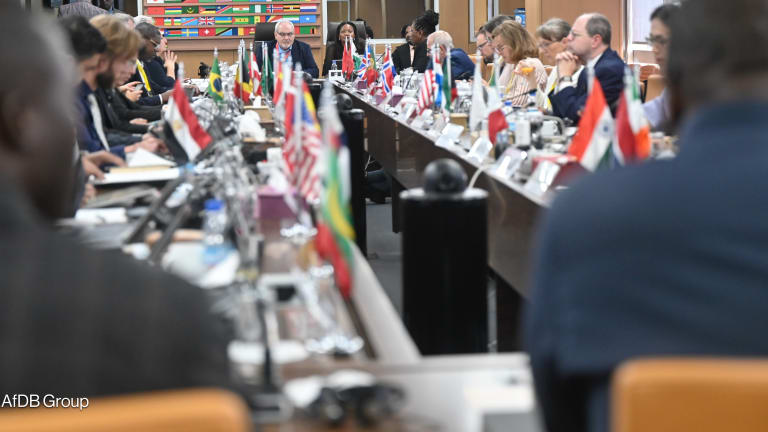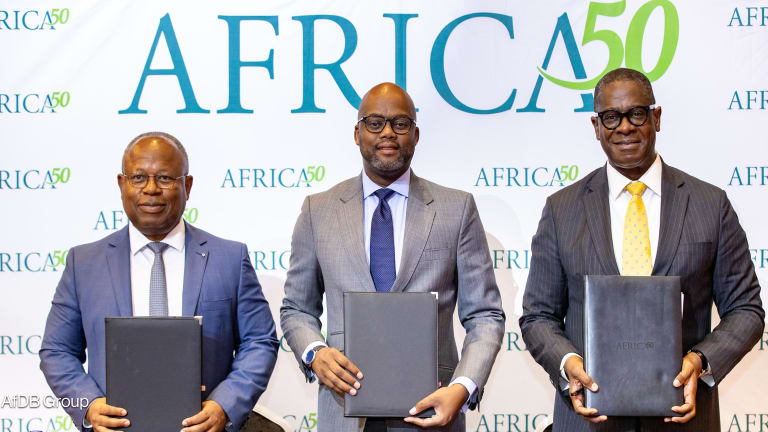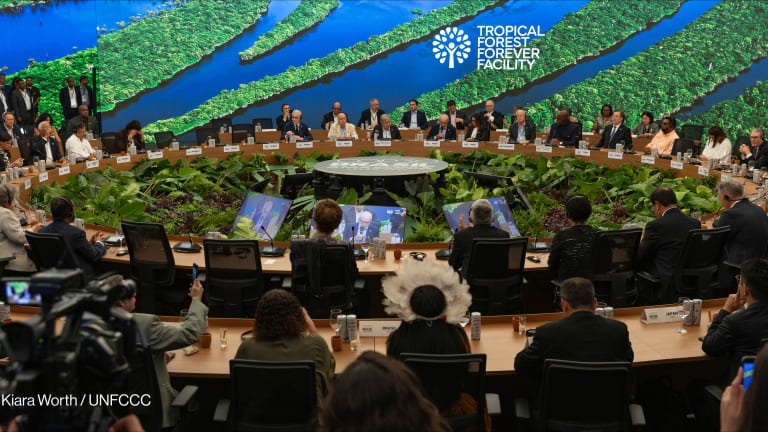Q&A: Saudi Arabia as a new social impact investor in Africa
Emerging market fund managers and development officials were among the 3,500 guests who came to Riyadh this week to find out what opportunities Saudi Arabia's newly launched sovereign wealth fund could offer for the continent. Michelle Essomé, CEO of the African Private Equity and Venture Capital Association, tells Devex how the continent can find new opportunities for impact.
RIYADH — Saudi Arabia’s sovereign wealth fund is looking at emerging markets to help bring in the ambitious returns it is seeking over the coming decades. Through six separate funds, Saudi Arabia’s Public Investment Fund (PIF) is targeting 8 to 9 percent returns between now and 2025. The African continent holds some of the most promising returns for patient capital, PIF officials told global investors this week. “PIF is a long-term investor, so of course we really do care about the cycle, but we are looking beyond,” its managing director, Yasir bin Othman Al Rumayyan, told the Future Investment Initiative conference this week in Riyadh. “We are looking 2030 and beyond that.” Devex sat down with Michelle Essomé, CEO of the African Private Equity and Venture Capital Association, to discuss how Saudi capital could contribute to impact investing, economic growth, and macroeconomic development on the continent. The message from Essomé and other business leaders — many of whom had traveled to Saudi Arabia for the first time — was to stay tuned. Through their sovereign wealth funds, Saudi Arabia and other Gulf states are poised to play an increasing role both as providers of capital and as influencers in African development for decades to come. This interview has been edited for length and clarity. How could Saudi Arabia’s sovereign wealth fund contribute to impact investing in Africa? With regards to social impact, that’s something we’re thinking about as an industry: letting the world know that in Africa we’ve been looking at impact investing for 15 to 20 years. It’s very much in vogue now. The African PE industry was started by the development finance institutions — so International Finance Corporation, African Development Bank, [Netherlands Development Finance Company] FMO — and as that capital comes from taxpayers, it comes with a certain requirement that there’s job creation, that it helps their local communities. Each of the fund managers [in Africa] have had to report on that on a quarterly basis. I’m excited because I feel that sovereign wealth funds are intelligence allocators of capital. They tend to be, wherever they are — whether it’s the South Africa sovereign wealth fund or the NSIA [Nigerian Sovereign Investment Authority]. [It’s] great to have them from a PE perspective. They function as signalers and influencers for bigger African venture funds — [telling them] they don’t need to be afraid of PE. PE as an asset class. I consider it to be very circular. So an investor is investing in a business, and if it does well, they’re going to hire. As people get jobs, they’re going to send their kids to good schools, they can buy homes. It creates this nice circularity. I think as sovereign wealth funds, hopefully they’ll put more money in PE in emerging markets, and that can help from a development standpoint to reduce inequality. Do you think there are particular opportunities on the African continent well suited to an investor like Saudi Arabia? Infrastructure. There’s a stat that $90 billion need to go into infrastructure in Africa. The CEO of the Public Investment Fund [Yasir] talked about six different funds they have — [and two are] international and then megainternational. Africa has a huge infrastructure gap. We can create infrastructure that boosts productivity and job creation, partnering with the likes of PIF or even African governments — the Chinese have been investing in infrastructure [like this] for a long time. Also energy, renewables, and power. To the extent that [Saudi Arabia] wants to do smaller things, [there are sectors] like financial services — anything that’s consumer related. Also any of the retail sectors, FMCG [fast-moving consumer goods], all of the manufacturing and agriculture. There are quite a few emerging-market players here. Do you see that as sending a message that Saudi Arabia is open for business? What I’ve taken away from this is that they want to change the perception of the country. I think the fact that the prince is there [is indicative.] This generation of young people is always going to be forward thinking, thinking of efficiency and communication and dynamism. And that’s what we see. So it’s not just Saudi Arabia is open for business, but it wants to invest around the world in different things. I think there is a good mix of people from around the world here, whether entrepreneurs or providers of capital, and they want to create a dialogue and want us to be connectors or transmitters of what we’ve found here. That being said, change is really hard and it takes a long time. I can only imagine all of the things that need to be balanced as you try to change cultures. But it’s a good first step. What’s the pitch you make to Saudi and other institutional investors here about the reason to invest in African private equity? For a balanced portfolio, you need alternatives, and the private equity investment class is a positive one. I think Africa is very much overlooked. It can be easy to look at the 54 countries as one continent. Also it’s so big, it’s like, where do you start? You have the demographics being very positive in terms of size and youth of population. They will need jobs, education. There are health care needs. [They have] disposable income — everybody wants the newest device or television, so from a consumer perspective that’s a great market you can sell to. [There’s more and more] connectivity. The opportunities are huge, and often times investors are dissuaded when they feel taken aback, because you think about things like corruption. It’s not that those aren’t big things, and of course you have to do your background research and checks, the same exercise as in any emerging markets. But there are ways that you can mitigate [risks] if you just do what you need to do. That shouldn’t dissuade us. The economic fundamentals are very strong, and that’s not abating. We have a number of countries where the GDP growth is strong. The governments very much understand the power of foreign investment and private capital. They are putting in place policies that make it easier to create businesses, to invest in businesses, to repatriate money that you need to return to your investors. I think that there are countries like Nigeria and Kenya that you can’t ignore. Also you’ve had these DFIs who have taken the first risk. Would having more sovereign wealth funds invest in Africa also help de-risk from a perception standpoint? Absolutely. Everybody always wants to follow smart capital. They have a role to play because they are very smart, across the asset spectrum and around the world. It would be important for us to talk about the African investments, because it makes it something to think about instead of just being dissuaded by headlines. If you just think about wars or conflicts or AIDS, you’re totally missing the point. Is there a benefit to having more non-Western investors involved in African markets? There’s a big role for local capital, for example what we call the African local pension funds. So that could be the Central Bank of Kenya, which just made [its] two first contributions to private equity. Historically there is this fear of alternatives. But as people are living longer and there are different dynamics, you need a diversified portfolio and one that will have the returns you’re looking for. I think the private asset class is a very good one in Africa for growth equity. We hope that the Gulf sovereign wealth funds, also the Western LPs, can be investing. Asia as well. But also smaller $100 million pension funds in Africa. If the big boys are doing it, we should think about putting our toe in the water as well. Can you share some examples of investments that have returned impact? One company is LeapFrog, founded by Andrew Kuper. It invests in financial services in Africa — things like insurance companies that help people with HIV/AIDS, who need insurance to buy homes. Emerging Capital Partners invested in a coffeehouse that was started by an AIDS worker called Nairobi Java House. It’s spread throughout the region and competes with Starbucks. They have a pizza place and a yogurt place and it was just sold to the Abraaj Group. [In terms of] impact, [the investors] do a lot of training. I think that’s important — to develop any company, it has to be about developing the indigenous population. The impact can be on education, on health care, on helping people just improving lives. We are also increasingly seeing more development on the venture capital — helping companies, entrepreneurs. What are some of the changes in big African markets’ legislative environments that facilitate greater private foreign investment? I think one big efforts can be funds set up by governments that support VC. For example. the La Banque Centrale des Etats de l'Afrique de l'Ouest has a $100 million small- and medium-sized enterprise fund. Also the AfDB has a program called Boost Africa that’s all about supporting smaller businesses. There are also questions like, ‘Can you start a business in a day? What kind of technical assistance can you get to start your business?’ Technical assistance may not be money, but also training. So if your business is in technology, can you have a mentor related to help you in business plan writing, KPIs, HR, or working capital. An entrepreneur maybe has an idea but hasn’t run a business before. Check out more practical business and development advice online, and subscribe to Money Matters to receive the latest contract award and shortlist announcements, and procurement and fundraising news.
RIYADH — Saudi Arabia’s sovereign wealth fund is looking at emerging markets to help bring in the ambitious returns it is seeking over the coming decades. Through six separate funds, Saudi Arabia’s Public Investment Fund (PIF) is targeting 8 to 9 percent returns between now and 2025.
The African continent holds some of the most promising returns for patient capital, PIF officials told global investors this week. “PIF is a long-term investor, so of course we really do care about the cycle, but we are looking beyond,” its managing director, Yasir bin Othman Al Rumayyan, told the Future Investment Initiative conference this week in Riyadh. “We are looking 2030 and beyond that.”
Devex sat down with Michelle Essomé, CEO of the African Private Equity and Venture Capital Association, to discuss how Saudi capital could contribute to impact investing, economic growth, and macroeconomic development on the continent. The message from Essomé and other business leaders — many of whom had traveled to Saudi Arabia for the first time — was to stay tuned. Through their sovereign wealth funds, Saudi Arabia and other Gulf states are poised to play an increasing role both as providers of capital and as influencers in African development for decades to come. This interview has been edited for length and clarity.
This story is forDevex Promembers
Unlock this story now with a 15-day free trial of Devex Pro.
With a Devex Pro subscription you'll get access to deeper analysis and exclusive insights from our reporters and analysts.
Start my free trialRequest a group subscription Printing articles to share with others is a breach of our terms and conditions and copyright policy. Please use the sharing options on the left side of the article. Devex Pro members may share up to 10 articles per month using the Pro share tool ( ).
Elizabeth Dickinson is a former associate editor at Devex. Based in the Middle East, she has previously served as Gulf correspondent for The National, assistant managing editor at Foreign Policy, and Nigeria correspondent at The Economist. Her writing also appeared in The New Yorker, Wall Street Journal, New York Times, Politico Magazine, and Newsweek, among others.








